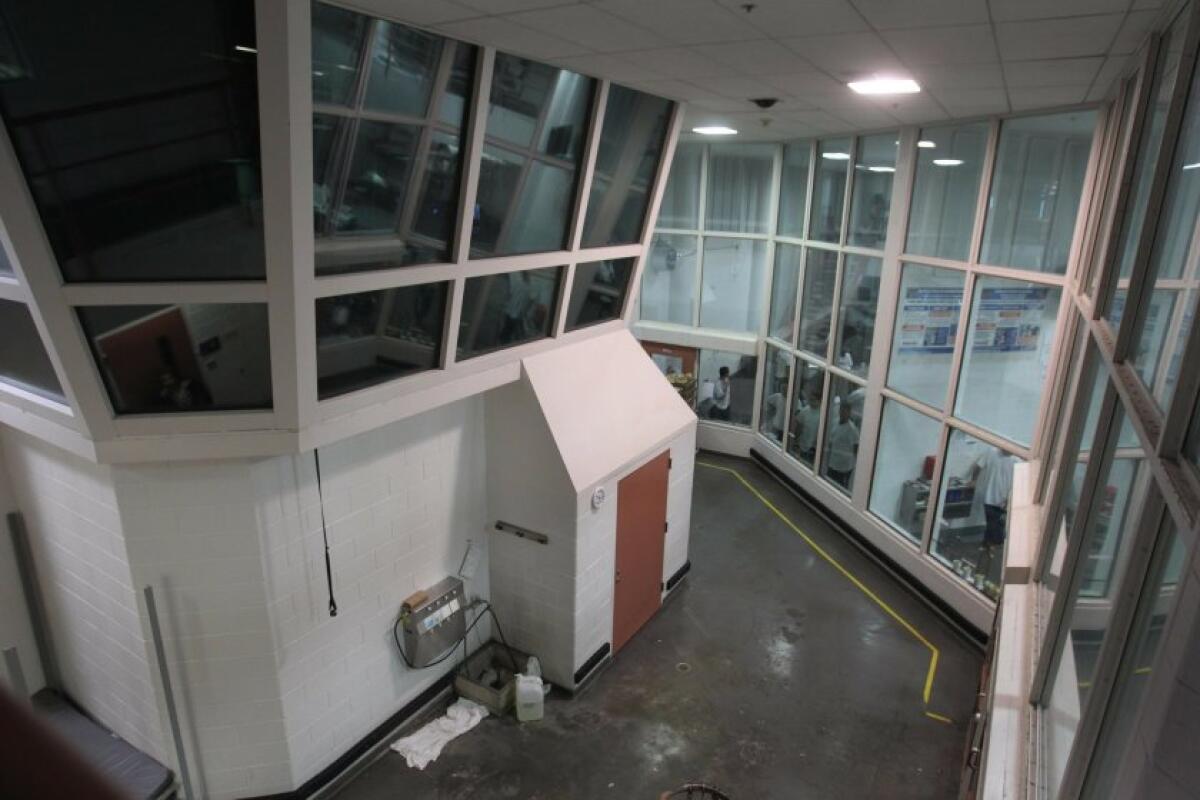San Diego County jails to adopt body-worn cameras after scathing audit over inmate deaths

- Share via
SAN DIEGO — Some deputies were outfitted with body-worn cameras late last week in the first San Diego County jail to use the technology, officials said Tuesday, following a scathing state report on inmate deaths in the jail system.
The pilot program includes 72 deputies at the Las Colinas Detention and Reentry Facility, a women’s jail in Santee, all of whom received their cameras Friday. That’s about 30% of the 230 deputies that work at the facility, according to the San Diego County Sheriff’s Department.
Officials said they will collect surveys from the deputies participating in the program. The feedback will be used to improve the department’s body-worn camera policies as the program expands to other county jails and to identify best training practices.
The county made significant infrastructure changes to the jail before the program could be implemented, department officials said. A room was built to house docking stations for the cameras, and the jail’s electrical and internet systems were upgraded to facilitate charging and data transfers.
San Diego County is paying out $1 million to the family of Ivan Ortiz, who was 26 when he died in San Diego County jail two years ago.
Patrol deputies were the first to be outfitted with body-worn cameras in 2017. The department said in a statement that it was always the goal to provide the technology to deputies working in all seven of the county’s jails, and that starting with cameras on deputies at Las Colinas will help shape the expansion of the program.
Video footage provides critical evidence for investigations into incidents and complaints, officials said. Currently, most jails only have stationary cameras.
“This is ultimately about the safety of the people in our custody and those who work in our facilities,” acting Sheriff Kelly Martinez said. “Having body cameras in our jails will also strengthen our relationship with the community by increasing accountability and trust.”
According to the current policy governing the use of the cameras in jails, deputies should activate their cameras when:
- Moving or escorting an incarcerated person from one area to another;
- Entering a cell, dormitory housing or holding area inhabited by incarcerated people;
- Booking people into jail or handling other parts of the intake process;
- Searching housing areas, cells or dorms;
- Supervising incarcerated individuals on work duty and;
- Moving incarcerated people into or out of transport vehicles.
There are also instances in which deputies are advised not to turn on their cameras so as to respect an inmate’s privacy, including when an inmate is taking a shower, being strip searched or talking to a lawyer.
Las Colinas nurse faces up to four years in prison if convicted in the death of Elisa Serna
The announcement follows a highly critical state audit released early last month that found the Sheriff’s Department had repeatedly failed to adequately prevent and respond to the deaths of inmates. From 2006 to 2020, 185 inmates have died in San Diego County jails.
The audit said the Sheriff’s Department “did not consistently follow up with” inmates who needed medical and mental health services, and concluded that lack of attention may have contributed to their deaths.
The report noted that when deputies did check up on inmates, these safety checks often amounted to inadequate glances that sometimes missed inmates in distress.
Auditors recommended the department revise its safety policy to require staff to check inmates’ welfare without disrupting their sleep. The department noted that the expansion of its body-worn camera program would assist in capturing deputies’ points of view during these safety checks.
More to Read
Sign up for Essential California
The most important California stories and recommendations in your inbox every morning.
You may occasionally receive promotional content from the Los Angeles Times.












